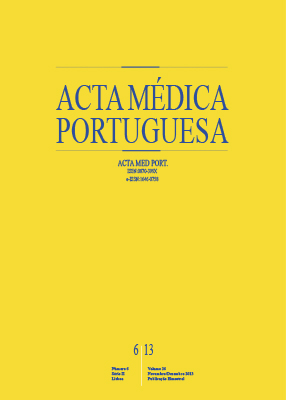Giardia Duodenalis and Chronic Malnutrition in Children under Five from a Rural Area of Guinea-Bissau
DOI:
https://doi.org/10.20344/amp.2091Abstract
Introduction: Malnutrition and infections by intestinal parasites such as Giardia duodenalis coexist in the same geographical regions, reaching the highest prevalence in developing countries. The cycle of malnutrition and infection implies that both conditions can aggravate each other and compromise the growth and development of children with special relevance for under-five. The aim of this study was to investigate the association between chronic malnutrition and infection by G. duodenalis in children under five in a rural community in Guinea-Bissau.Material and Methods: A case-control study that included 109 children aged 0 to 59 months of a rural community in Guinea-Bissau was conducted. The anthropometric assessment of children in the study identified 31 cases of chronic malnutrition (z-score height for age < -2) and 78 controls (z-score height for age ≥ -2). Microscopic examination of stools was performed for detection and identification of G. duodenalis and other parasites.
Results: The microscopic analysis of stool samples revealed G. duodenalis infection in 29.0% (9/31) of cases and 35.9% (28/78) of controls. No association between the infection with G. duodenalis and chronic malnutrition in children under study could be established.
Discussion and Conclusion: The results reinforce the interest in designing further studies exploring this association in different
regions and epidemiological settings, while direct to the importance of the criteria for malnutrition definition which influences the subsequent analysis.
Downloads
Downloads
Published
How to Cite
Issue
Section
License
All the articles published in the AMP are open access and comply with the requirements of funding agencies or academic institutions. The AMP is governed by the terms of the Creative Commons ‘Attribution – Non-Commercial Use - (CC-BY-NC)’ license, regarding the use by third parties.
It is the author’s responsibility to obtain approval for the reproduction of figures, tables, etc. from other publications.
Upon acceptance of an article for publication, the authors will be asked to complete the ICMJE “Copyright Liability and Copyright Sharing Statement “(http://www.actamedicaportuguesa.com/info/AMP-NormasPublicacao.pdf) and the “Declaration of Potential Conflicts of Interest” (http:// www.icmje.org/conflicts-of-interest). An e-mail will be sent to the corresponding author to acknowledge receipt of the manuscript.
After publication, the authors are authorised to make their articles available in repositories of their institutions of origin, as long as they always mention where they were published and according to the Creative Commons license.









